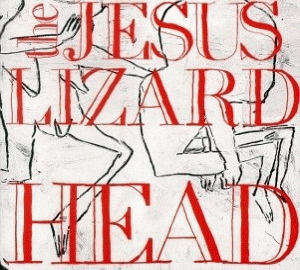There has lately been a swath of records that have received the remaster treatment in the last year or so. From the undeniably deserved undertaking of The Beatles’ catalogue and The Stone Roses’ self-titled debut to the simply gratifying here-you-go of Nirvana’s Bleach, audiophiles alike have plenty to keep themselves busy with before the New Year rolls around. The Jesus Lizard reissues fall somewhere in between these two categories. I have to admit that when Touch and Go first announced the re-releasing of the band’s first four albums to coincide with their reunion, I was a bit puzzled. These records are less than 20 years old. It’s a grateful gesture, sure, but such an undertaking didn’t really seem to be a necessity. And the oft-taken path of “cleaning up the sound” just doesn’t seem to connect with the nature of the band’s output.
So it’s a good thing that their original producer Steve Albini personally helmed the remasters alongside Bob Weston of Shellac, known for his spectacular job on Sebadoh’s Bubble and Scrape. Albini is one of those few producers that actually takes his job seriously. And both of these guys have shown quite well just how vigilant they are with handling the band’s material. If any of you fans are expecting (or for that matter, fearing) a completely different sound, you shouldn’t. The overall production is a little cleaner, the drums are turned up a bit, and on certain tracks you can even make some sense out of David Yow’s vocals upon first listen. But for the most part, Albini and Weston have left things untouched. Likely their biggest contribution on these remasters is the carefully-chosen bonus material selected from live performances, singles, EPs, and unreleased demos.
Head is not as widely acclaimed as their later records, but it deserves a good nod nonetheless. “One Evening” is a great opening tune, introducing the listener to the explosive rhythm section that develops more fully on Goat. The pacing is still quirky, since the album kind of dozes off in the middle but then suddenly kicks up towards the end with the intense “Killer Mchann.” The Pure EP (also available on the first reissue) is present along with some great live tracks, including one of “Bloody Mary,” which makes this debut worth your time alone.
Then we have Goat. This is the band in full force. Yow’s already-mutilated voice assumes the howl of a startled horse being buried alive. He chortles and croaks his way through “Seasick” and shrieks like a mad street preacher on “Monkey Trick.” His tantrums on the amusingly titled “Then Comes Dudley” and “Lady Shoes” materialize comfortably alongside the chugging bass of David Wm. Sims and Mac McNeilly’s spot-on drum work. But the real winner here is Duane Denison. His methodically constructed guitar riffs perfectly compliment Yow’s belligerent outbursts on “Karpis.” Their interlocking melodies sound like a married couple on the verge of a violent and ugly divorce.
Liar is more or less an extension of the band’s ever-increasing full-frontal attitude found on Goat. The album is truly terrifying and exemplifies the band at its lyrical and musical tipping point. “Rope,” a song about a man being tied up and left for dead, breaks into some sort of deformed rockabilly riff, leaning towards a punk attitude that places itself suitably beside Stick Men With Ray Guns material. In “The Art of Self-Defense,” Sims’ bass unleashes an artillery barrage over the entire track, a refreshing change in musical direction from Denison’s usually dominant guitar. And on “Puss,” Yow pleads in a congested gurgle, “Get me something to stop the bleeding / ’cause I’m fittin’ to blow.” I guess we were a bit too late.
Down has often been referred to as a creative 180 spin for the band, and for that reason alone it has often received more lukewarm praise than their previous efforts. But nothing has significantly changed musically on this album. Denison’s heavy guitar lines still viscerally creep up and down each track – save for the absurd and unnecessary “Low Rider” – and Sims and McNeilly keep the rhythmic pace pretty steady when allowed. What really transforms (and suffers) on this album is Yow’s voice. It sounds inundated with exhaustion. It’s fairly apparent on the opener, “Fly on the Wall,” in which he more or less eschews the aggressiveness of the music. Yow still yelps and screams, but that recognizable anger of his found on Goat and Liar isn’t really present. Overall, it almost appears he was deliberately put in the backseat for this record.
Even though they faced a bit of a critical jab with Down, it’s irrefutable that The Jesus Lizard are one of the key bands that exemplified the ’90s underground noise-rock movement, only aided further by their uncompromising creativity. The least these remasters can give fans is a renewed sense of appreciation for how quickly the group developed musically in such a short period of time – all four albums were all released within five years of each other – and more importantly how Albini’s unhinged DIY attitude allowed for that to happen. As for newcomers to their music, they offer a more focused point of introduction. I have to admit, if Touch and Go thought the time was now to reissue these records, they at least did it right.

